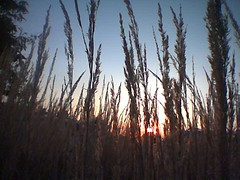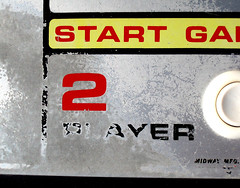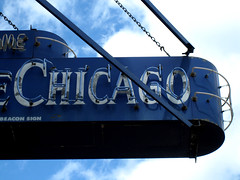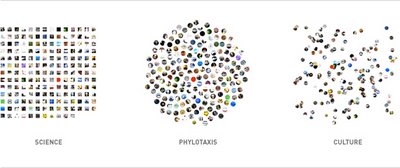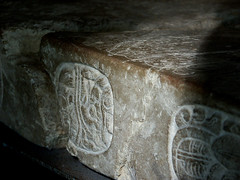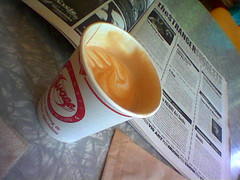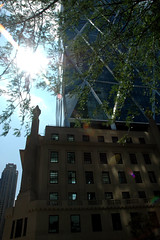two earnest women
discuss the need to be blonde
spoiled kids cling and sway
Saturday, September 30, 2006
from the W.T.F. department

Retracing her route this week through the museum’s European and contemporary galleries, Ms. McGee passed the marble torso of a Greek youth from a funerary relief, circa 330 B.C.; its label reads, “his nude body has the radiant purity of athlete in his prime.” She passed sculptor Auguste Rodin’s tormented “Shade;” Aristide Maillol’s “Flora,” with her clingy sheer garment; and Jean Arp’s “Star in a Dream.”Ms. McGee is the fifth grade teacher in Frisco, Texas who was suspended from her job this week when one of her students was “exposed to nude statues and other nude art representations” during a Principal approved school trip to the Dallas Museum of Art, as reported in the New York Times. The kid’s parents complained.
Here’s a thought: Any cities acting stupid and disregarding hundreds (thousands!) of years of cultural understanding regarding the Arts gets mandatory secession. Starting now.
Let’s go ahead and include respected scientific theory in this one – Kansas City: you can follow Frisco, Texas out the door for that Creationism nonsense last year.
Update: But wait, there's more! Just when you thought you had the whole crazy American morality thing figured out, then there's this: Kellie Everts, Stripper for God » (via Gaper's Block)
the kingdom come
 At six hours long, The Kingdom is the kind of movie you provision for.
At six hours long, The Kingdom is the kind of movie you provision for.I first saw it at the Seattle International Film Festival – on a fluke. After several hours of deliberation with my then-husband over the SIFF schedule, I was dispatched to buy the tickets (I usually got the chores – it was our way) with our preciously spare cash supply. Standing in line (this was in the dark days, before e-commerce penetration) reviewing the schedule again, The Kingdom caught my eye. It was sold as a block the tickets that spanned two sequential nights; three-hour screenings each.
I didn’t know about Lars von Trier then, and the genre – horror – was one that I usually avoided, if only because too many filmmakers make slashers and call them horror films (which is not the same thing, folks).
It wasn’t on our agreed-upon list, but I went ahead and bought a block of tickets. B looked at me like I was a nut when I got home and explained the purchase to him, but he dragged his ass along anyway.
It was either the fact that it was shot for Danish television in video format, or that it was shot by von Trier, that made for an incredibly grainy projection at Seattle’s Egyptian Theater – but I was hooked from the get go. As was the rest of the audience that night (I love it when an audience gets behind a film and gets noisy – in all the right places). Even B enjoyed it enough to forget that it was my idea in the first place (that was also our way).
Great characters, convoluted plot, plenty of gotchas. The kind of movie that lives with you for awhile afterwards and subverts your perception of everything that used to be normal.
But hey, what do I know? The effusive Sumez over at IMDb says it better than I ever could:
One of the best horror movies ever!
To me, this was the production that made Lars von Trier stand out as an extraordinary movie director and the movie, that finally pushed the Danish movie scene in the right direction!
It sort of founded the modern Danish dogma/dogme inspired movie style with its grainy colours, rash use of cutting and camera movement as well as strange, yet very realistic acting. All used to develop the perfect atmosphere around a good horror movie! There is just one thing you must remember when watching Riget/The Kingdom. It is a movie. It is entertainment. It is no comedy, yet nothing in the movie is serious. It uses sick and sometimes just weird ways of building up the horror. It doesn't have to make sense.
A lot of people may not like this because it is typically Danish, which may easily frustrate anyone who is only used to high budget Hollywood movies. The not-so-obvious deeper meaning between the lines as well as all the bold and underlined lines that have no meaning at all could confuse certain minds, but if you are prepared for a bunch of self-irony and sweet horror scenes, and if you like writers/directors such as David Lynch and Chris Carter, you are going to love this!
It is nice to see that mentally freaked out horror movies didn't die out with The Exorcist, and this definitely isn't any worse!
Plus it won the Golden Spaceneedle Award at that year's festival: And what better validation could there be than receiving a golden pointed Googie object?
Highly recommended with Halloween coming.
p.s. Speaking of film festivals – Chicago’s opens on October 5th.
the obliquity of the elliptic
a found poem
The sky was nearly cloudless
Packed with celestial bodies
Smears of the Milky Way
And long scribbles of falling stars
A few conversations floated on the air
Two men swapped tales of the Southern Cross
A gray haired woman whispered intensely
A young couple kept silent
Nuzzling between the pines
The moon is a more complex creature
Than any planet or star in the sky
A tip of the silvery crescent
Appeared in the cleft between the spires
Inch[ing] into view
Like a moth emerging from a dark chrysalis
Coyotes began to yip and howl
[And then] fell silent
The moon disappeared
An ember dying
Strangely moving it was
To stand silently
With strangers
Gazing fixedly on the sky
Found in «Where the Moon Stood Still, and the Ancients Watched» in yesterday's New York Times -- a travel piece by Miriam Horn recounting the moonrise over Chimney Rock, Colorado, where every 18.6 years, from the mesa, the moon appears to rise directly between the two rock spires for several nights in a row.
The sky was nearly cloudless
Packed with celestial bodies
Smears of the Milky Way
And long scribbles of falling stars
A few conversations floated on the air
Two men swapped tales of the Southern Cross
A gray haired woman whispered intensely
A young couple kept silent
Nuzzling between the pines
The moon is a more complex creature
Than any planet or star in the sky
A tip of the silvery crescent
Appeared in the cleft between the spires
Inch[ing] into view
Like a moth emerging from a dark chrysalis
Coyotes began to yip and howl
[And then] fell silent
The moon disappeared
An ember dying
Strangely moving it was
To stand silently
With strangers
Gazing fixedly on the sky
Found in «Where the Moon Stood Still, and the Ancients Watched» in yesterday's New York Times -- a travel piece by Miriam Horn recounting the moonrise over Chimney Rock, Colorado, where every 18.6 years, from the mesa, the moon appears to rise directly between the two rock spires for several nights in a row.
Friday, September 29, 2006
the silly season
But politics won today. Politics won. The Administration got its vote, and now it will have its victory lap, and now they will be able to go out on the campaign trail and tell the American people that they were the ones who were tough on the terrorists.
And yet, we have a bill that gives the terrorist mastermind of 9/11 his day in court, but not the innocent people we may have accidentally rounded up and mistaken for terrorists – people who may stay in prison for the rest of their lives.(...)
That is not how we should be doing business in the U.S. Senate, and that’s not how we should be prosecuting this war on terrorism. When we’re sloppy and cut corners, we are undermining those very virtues of America that will lead us to success in winning this war. At bare minimum, I hope we can at least pass this provision so that cooler heads can prevail after the silly season is over. Thank you.
Barack Obama speaking before the Senate on the detainee bill. (Via Atrios.)
I have deep reservations about calling this fine mess we've got ourselves into a "War on Terrorism", so it makes me a bit queasy to hear Obama refer to it the way he does here. But I excuse him in my mind the way I excuse Lincoln when I read about the ways he played to the crowd in an effort to get everyone pointed in the same direction on the whole dissolution of the Union question. 'Cause once he had won his seat and push came to shove, he kicked some serious ass.
(See: Emancipation Proclamation. Genuine equivocation loaded with political pandering -- like not freeing folks who were enslaved within the Northern states, and only bothering about those who were out of reach, within the Confederacy -- but his heart was in the right place. And these many years later we only remember the heart part. And the setting people free, part. Good stuff, that.)
Maybe that just makes me a fool in love, but baby, I've gotta have someone to believe in. The pickin's are pretty slim around here.
p.s. I also find it a bit incredulous that he would call something so serious "the silly season" -- I wonder if the transcriber got it wrong -- I wonder if he called it "the selling season"?
Labels:
american slavery,
barack obama,
human rights,
quote
changes
I’m in the habit of pulling random books off my bookshelf in the morning, in the room where I iron my clothes for the day, and while the iron amps up I open to a random page and read random snatches of whatever it is that the book is about to give me something to wonder about.
There are all kinds of strange books on that shelf.
This is the snatch that I grabbed this morning, on a day when the air was crisp for the first time and the season had clearly made up its mind to change:
I had pulled another book from the shelf just before I pulled that last one – and here’s what was on that random page:
I hate it when that happens.
(No. Not really. I actually like it quite a bit.)
There are all kinds of strange books on that shelf.
This is the snatch that I grabbed this morning, on a day when the air was crisp for the first time and the season had clearly made up its mind to change:
SOME CHANGES
your particular heart: my
winter ear
will hear, you,
will. the broken
streak of
luck denotes a change
in seasons, love,
or sweaters
it makes no matter
your particular heart: insistent
~ Max Finstein
I had pulled another book from the shelf just before I pulled that last one – and here’s what was on that random page:
If one desires a change, one must be that change before that change can take place. ~ Gita Bellin
I hate it when that happens.
(No. Not really. I actually like it quite a bit.)
space is the place

From the moment he discovered the material, Corbett wanted to keep it together as a singular archive of Sun Ra’s Chicago years, and he hopes eventually to find an institutional home for it. “It only articulates a story if it’s together,” he says. “Little bits and pieces of it are collectorfetish ephemera, but when it’s all together you start to see this interesting phenomenon . . . which is the way that Ra sort of fit into a southside Afro-futurist community of thinkers, designers, and musicians who were all pondering the future, independent businesses, and separatism.”John Corbett in « Ra Materials » by Peter Margasak in this week's The Chicago Reader
You're either going to care about this a whole lot, or be completely indifferent. I'm posting this for someone dear to me who I expect will trend toward ape-shit.
The show, "a treasure trove of Sun Ra ephemera: album art, recordings, writings, ledgers, and scraps of paper like ticket stubs and gig flyers," opens on Sunday in Chicago's Hyde Park Art Center.
Pathways to Unknown Worlds: Sun Ra, El Saturn & Chicago’s Afro-Futurist Underground, 1954-68
Hyde Park Art Center, 5020 S. Cornell
773-324-5520
Reception 10/15, 3-5 PM
Show runs from Oct 1st through January 14th
Admission is Free
Thursday, September 28, 2006
short straw
There are four enemies of human rights: oil, gas, the war on terror and geopolitical considerations, and we have all four.
Yevgeny A. Zhovtis of the Kazakhstan International Bureau for Human Rights and Rule of Law, as quoted in this morning’s New York Times.
rolled trousers
I grow old, I grow old, I shall wear the bottom of my trousers rolled.
~ T.S. Eliot going off about that Prufrock fellow
My dad spent a lot of his life working in the music business, and his tenure intersected with a particularly interesting chapter of that business, so it’s not uncommon for him to lob out a story that involves immediately recognizable players. The stories are always relevant to the context at hand, but they’re usually too brief for my liking.
Like the one where he was hanging out at the Playboy Mansion in Chicago with Jim Morrison. Just hanging out, after a party had wound down, in the early hours of the morning. And Morrison mentioned that he had just been to see the doctor, and the doc told the 20-something Morrison that he had the body of a 70 year old man.
Morrison died within the year.
“What else did he say, Dad?”
“We talked about a lot of things. We had a great talk.”
And thus ends the story.
Yeah: I know. I’ve told him to write the book. The one that would include the stories about Jerry Garcia and Jimi Hendrix and eating ribs on Nob Hill with Muddy Waters. And he keeps shrugging me off.
But hey, the point of this post is that you too can figure out how old your body is relative to your age – the New York Times serves up all kinds of insight this morning in their piece on Who’s Older, You or Your Body? – which is nearly, sorta, almost as cool.
(But hell if I can find the piece indexed online – Bally Fitness is calling the program RealAge, but I can’t find it on their site either. Oh well. At least I got to tell you the Morrison story.)
Wednesday, September 27, 2006
speaking of sideways
This clip would have captured a perfect moment if, like an idiot[1], I hadn't tipped my little Canon handheld on its side when I was shooting the video -- as if I were snapping a photo.
And if, oh yeah, I hadn't been carrying a heavy bag so that with every other step I wasn't lurching like Quasimodo.
And maybe if I had recorded a little bit *more* of the song so that you could hear what it was that this fellow was singing like a clarion angel at 5.30 on a Monday morning down a long, empty, echoing hallway at O'Hare as I made my way to my gate to catch my flight.
But knowing all that, maybe you can fill in the blanks. (Because it really was perfect.)
[1]Yeah, I know: it wasn't the first time, and to make matters worse, I broke my promise.
And if, oh yeah, I hadn't been carrying a heavy bag so that with every other step I wasn't lurching like Quasimodo.
And maybe if I had recorded a little bit *more* of the song so that you could hear what it was that this fellow was singing like a clarion angel at 5.30 on a Monday morning down a long, empty, echoing hallway at O'Hare as I made my way to my gate to catch my flight.
But knowing all that, maybe you can fill in the blanks. (Because it really was perfect.)
[1]Yeah, I know: it wasn't the first time, and to make matters worse, I broke my promise.
intertwingularity
Intertwingularity is not generally acknowledged – people keep pretending they can make things deeply hierarchical, categorizable and sequential when they can’t.
Everything is deeply intertwingled.
Ted Nelson, one of the fathers of hypertext, as quoted by Peter Morville in Ambient Findability
done gone
The idea, Mr. Newman said, is to return the theater to the significance it once held, while making the grounds a community gathering spot.
To that end he and the team behind the restaurant already have a weekly farmers’ market going in the parking lot. Mr. Newman hopes to add electric go-carts too, a point that he likes to bring up as often as he can and that the people around him try their best to ignore.
From today’s New York Times piece on Paul Newman’s new restaurant, Dressing Room, which will open alongside the Westport Country Playhouse – a regional theater that he and his wife have had a hand in saving.
I would like that – to see the theatre return to the significance it once held – but folks, I’m afraid that boat has sailed. Population patterns, competing entertainment sources, modes and venues, the fact that fewer folks are writing for the theatre or engaged in the business of putting on a show – we’ll never go back there again, not to the Broadway of the 30s, 40s, and 50s.
But I’m all for enjoying a good show and great meal afterwards, anyway. Because good theater – stories told out loud – that’s the kind of fix that folks go to church for. If I have a religion, it’s this: tell me your story, and take the time to tell it well, because there’s magic and transformation in that. Not just in the story, but in the hearing and receiving.
And in the sitting around the table talking and drinking wine with friends afterwards. (There's magic and transformation there too -- sometimes more.)
that curious prairie dock
This plant rocks -- Seuss-like and indigenous to the prairie with indescribably large primeval leaves, the parent plant of this bloom grew to 8 feet tall this year.
Its sibling -- which doesn't get as much sun -- only hit 5 feet. (Wuss.)
Its sibling -- which doesn't get as much sun -- only hit 5 feet. (Wuss.)
Tuesday, September 26, 2006
blow out

I didn’t expect to take these pictures. I just knew that the bulb that blew in the small lamp that I keep on my office desk made a lovely white blast pattern on the glass and that I wanted to shoot it, but I didn’t expect this play of color and light when I did.
The results – shot from a single vantage point within just a few minutes -- surprised me the way filmmaker Stan Brakhage’s The Text of Light (shot through a crystal ashtray) surprised me when I first saw it as a student, lucky enough to be at one of his screenings.

I know it’s not even close to what he pulled off, but a girl’s gotta start somewhere.
Here’s a link to the whole slideshow »
for the b1-series-boys
You know what we had yesterday? Mountain Dew! (I was so excited.)
The stewardess to my left chatting over the beverage cart to her colleague.
It's the little things that matter.
Monday, September 25, 2006
airport security
Each piece must be removed
To suit the man who eyes me
Expressionless
The scarf
The jacket
“That too.”
I comply:
The suitcoat
The shoes
I cross to him
In stocking feet
He slowly stokes my thighs
His eyes are low
They don’t meet mine
He finishes and shrugs me on
I take my clothes and dress again
Hurriedly; eyes cast down
A whore at least gets paid
I just proceed to my gate
To suit the man who eyes me
Expressionless
The scarf
The jacket
“That too.”
I comply:
The suitcoat
The shoes
I cross to him
In stocking feet
He slowly stokes my thighs
His eyes are low
They don’t meet mine
He finishes and shrugs me on
I take my clothes and dress again
Hurriedly; eyes cast down
A whore at least gets paid
I just proceed to my gate
improbable plausibility
So what are the odds, in a world the size of this one, that I’d be having a conversation in a random Chicagoland suburb with a man I know only because a friend of his had once been assigned to a random consulting engagement in Seattle?
And what are the odds that I'd be working the same gig, and that this random consultant, who seemed a little bit shy, would care enough about coffee to accept my invitation to walk a little bit farther out of our way (to where the really good coffee was) and, in returning, that we would pass by a queue of Star Wars fans outside the Cinerama which would compel him to say something sly and wise and remarkably funny while alluding to Jung, which of course made me wonder what kind man this really was (because I wasn’t expecting Jung).
And what are the odds that wondering this little bit would lead me to wonder a little bit more which would lead me nearly a year later to cleave with a place that was more home to me than any home I’d known to settle in the foreign and unfamiliar flatlands of the Midwest -- where on this particular day I would find myself in a conversation with this dear friend of his who had developed a little bit of a crush (he’s married, so just a little bit of a crush) on a woman who is descended from a wine making family in Sonoma who periodically passes through Chicago pouring wines with such charm and generosity that married men are compelled to crush on her.
And what are the odds that, sometime before all this happened, I would spend the 15th summer of my life in the (then) sleepy town of Sonoma blanching French fries and pressing fresh meat patties at the Happy Dog (Home of the Charburger!) working under the efficient hard ass management of said wine family scion (who then was about 17 or so).
Given this improbable plausibility it would seem then perfectly reasonable that I’d approach the table where she was pouring the wine in an out of the way Chicagoland suburb (where I had gone with the married man and with his friend, the man I married) and ask (just to be sure) “are you the same Kathy Benzinger who worked at the Happy Dog in Sonoma, California?” to which she would blanch and shriek and hug me and say “what are the odds?” and what a small world this is.
And that’s what I did with my Saturday.
p.s. The Benzingers have turned out a really nice Merlot – worth getting over your “I’m not drinking any f*cking Merlot!” Sideways bias for. (And it's biodynamic, baby.)
And what are the odds that I'd be working the same gig, and that this random consultant, who seemed a little bit shy, would care enough about coffee to accept my invitation to walk a little bit farther out of our way (to where the really good coffee was) and, in returning, that we would pass by a queue of Star Wars fans outside the Cinerama which would compel him to say something sly and wise and remarkably funny while alluding to Jung, which of course made me wonder what kind man this really was (because I wasn’t expecting Jung).
And what are the odds that wondering this little bit would lead me to wonder a little bit more which would lead me nearly a year later to cleave with a place that was more home to me than any home I’d known to settle in the foreign and unfamiliar flatlands of the Midwest -- where on this particular day I would find myself in a conversation with this dear friend of his who had developed a little bit of a crush (he’s married, so just a little bit of a crush) on a woman who is descended from a wine making family in Sonoma who periodically passes through Chicago pouring wines with such charm and generosity that married men are compelled to crush on her.
And what are the odds that, sometime before all this happened, I would spend the 15th summer of my life in the (then) sleepy town of Sonoma blanching French fries and pressing fresh meat patties at the Happy Dog (Home of the Charburger!) working under the efficient hard ass management of said wine family scion (who then was about 17 or so).
Given this improbable plausibility it would seem then perfectly reasonable that I’d approach the table where she was pouring the wine in an out of the way Chicagoland suburb (where I had gone with the married man and with his friend, the man I married) and ask (just to be sure) “are you the same Kathy Benzinger who worked at the Happy Dog in Sonoma, California?” to which she would blanch and shriek and hug me and say “what are the odds?” and what a small world this is.
And that’s what I did with my Saturday.
p.s. The Benzingers have turned out a really nice Merlot – worth getting over your “I’m not drinking any f*cking Merlot!” Sideways bias for. (And it's biodynamic, baby.)
Sunday, September 24, 2006
summer gone.
I am not deceived, I do not think it is still summer
Because the sun stays and birds continue to sing.
It is summer-gone that I see, it is summer-gone.
The sweet flowers in drying and dying down,
The grasses forgetting their blaze and consenting to brown.
~ Gwendolyn Brooks
Because the sun stays and birds continue to sing.
It is summer-gone that I see, it is summer-gone.
The sweet flowers in drying and dying down,
The grasses forgetting their blaze and consenting to brown.
~ Gwendolyn Brooks
by taxi to St. Bart's

a found poem
Swami Bua is a hundred and seventeen
He can blow a conch for eight straight days
One note
One breath
[One] hundred and ninety four hours
His apartment is the one
With the sign on the door that reads:
To Ring Well
Please Press Well
The Bottom Bell
His face brings to mind
The knob on an old walking stick
And an ancient Yosemite Sam
(The guest was
To take the Swami to St. Bart’s
Where he was to issue the call to prayer
By blowing on his conch)
In the taxi he began to tell
Unintelligible stories
About wrestling Ethiopian Sheep
[The driver] was Haitian
Listening to Christian radio
As the Jesus talk gave way
To a brass processional
The Swami produce[d] the conch
It was tipped with silver at both ends
He began to blow.
The sound of the conch
Joined the brass
And the sirens in the street
The driver spun around, beaming
When the ride was over
He said to the Swami:
We will meet again
Found in « Swami » by Nick Paumgarten in this week's New Yorker Magazine.
myspace is...
A platform for self-crafted identity projection.Myspace.com according to John Deighton, the Harold M. Brierley Professor of Business Administration at Harvard Business School, as cited in an interview with Mr. Deighton in Working Knowlege.
seasonal selling
New Year’s Eve
Valentine’s Day
Fourth of July
Back-to-School Season
Times during the year when condom sales peak, according to Jim Daniels, the VP of Marketing for Trojan, as cited in « Here’s Your Syllabus, And Your Condom » in today’s New York Times.
I will not be sharing this marketing morsel with a friend of mine who just sent his daughter off to college.
Saturday, September 23, 2006
and now, for dessert
This is the clafoutis that I meant to make when I bought the itty bitty pears. But that was before they seduced me into eating them all, one by one.
I have no idea if the recipe is any good, but Patricia Wells’ Fig Clafoutis is killer, so I suspect if you do up this one you’ll be all right.
I have no idea if the recipe is any good, but Patricia Wells’ Fig Clafoutis is killer, so I suspect if you do up this one you’ll be all right.
Patricia Wells’ Clafoutis aux Poires
½ cup pear eau-de-vie or brandy
6 Anjou pears (or if they’re itty bitty pears pick up ~ 2 lbs. or 1 kg.)
6 large eggs
½ cup vanilla sugar (this is the sugar that you set apart in a jar with that vanilla bean that you rescued from the crème brûlée.) (What do you mean you mean you threw the bean away?! Okay, that's cool -- just use regular sugar and throw in a splash of vanilla.)
¾ cup unbleached all-purpose flour
½ cup crème fraîche or heavy cream
Pinch of salt
1 tablespoon confectioners’ sugar
Pick your bowl – make sure it’s big enough to hold all the pears before you’re done. Pour in the brandy and then peel and cut the pears – placing the slices in the bowl as you finish each one, stirring to coat. When they’re all in there give them one last gentle toss. Marinate 1 hour. (Turn them once in a while so that they don’t darken.)
Preheat the oven to 400 degrees; butter and sugar a 10 ½ porcelain baking dish.
Combine the eggs and vanilla sugar in a bowl and froth them up good. Slowly beat in the flour, cream and salt. Add the marinade that the pears have been soaking in. Mix until well blended.
Arrange the pear slices in the bottom of the baking dish. Wells recommends a spiral: I say follow your muse. Pour batter over the pears.
Place the dish in the center of the oven and bake until the batter is firm and the top is golden, about 25 minutes. Remove, cool, and sprinkle with powdered sugar.
Serve while still warm. (Room temp’s okay too.)
Adapted from Patricia Wells’ Bistro Cooking
karass my ass
For Alberto [Giacometti], intellect is an instrument at the service of sensitivity. In certain areas, however, his sensitivity takes odd forms; for example, his deep scorn for all emotional sloppiness.
But enough: he’s my friend.
Henri Carter-Bresson on his friend, Giocometti
Reading through Henri Carter-Bresson’s The Mind’s Eye has been a little bit like when I saw Harry Callahan at the Art Institute. I spent the whole of the viewing surprised, marveling at what he had made, at the diversity of his eye, gasping, quietly to myself, recognizing -- resonating – with something unlike anything I had ever seen.
That was somehow entirely familiar.
But that’s how these things happen when we find something that reminds of us things we’ve forgotten. Or didn’t know that we knew.
I’m not going to subject you to all of the little revelations that I’ve stumbled on in this wonderful collection of writings. But there’s something lovely about the last section, Part Three, that should be noticed. It’s called On Photographers and Friends.
Each chapter concerns a friend. Some are photographers. All are artists.
There’s such tenderness in these pages, and admiration. Bresson’s friends include Alberto Giacometti, Ernst Haas, Robert Doisneau, Robert Capa, André Kertész, Jean Renoir (the filmmaker -- son of the painter) and André Breton. There are others as well. And we learn in reading, as he writes about the friends he loves, and about the art they make, how he admires them, how he loves them, where they resonate on a clear, vibrating chord, and (sometimes) where they diverge.
Reading Bresson I was reminded of a passing remark made to me by a friend. Matter of factly she said: “You can have more than one soul mate, you know.” Maybe I did know: but her saying it lifted a heavy weight. The need to choose: to decide. To put all my chips on Black 22. (She also said: "You don't have to sleep with all of them," which was also an important revelation.)
Reading Vonnegut’s Cat’s Cradle years ago I was struck by a concept he presented – the karass – which describes a group of people who are bound together to get a job done. Working together, connected, like strings in the child’s game of Cat’s Cradle.
I don’t have the book on my shelves so I’m pulling this from memory, and I suspect that my reading of karass may be different from what Vonnegut intended it to be – but still, I’m deeply attached to it.
My karass-mates are my soul mates – there lives between us a quiet recognition of something shared – whether interests, sympathies, qualities or place – and quite frequently, upon meeting them, I’ve recognized them immediately (as I suspect they knew me), although it may have taken some time for that friendship to find its way into the patterns of my days. Sometimes it took years, and absences, before the reunion.
So it struck me last night, with my nose buried in Bresson’s last section, that there is really only this. Because while the world is full of mystery and wonder, and there’s much that I love about my solitude (the place where I spin and think) and about the work that I do -- it’s coming up for air, and finding a friend there, that makes any of it matter at all.
(And here I will stop, for fear of displeasing Giacometti, with my emotional sloppiness.)
Friday, September 22, 2006
sound grammar
There's is no bad music, only bad performances.
Jazzman Ornette Coleman in « Seeking the Mystical Inside the Music » in this morning's New York Times.
Great read if you're into music. If you're not into music (any kind, any way; your choice, just make it yours) you should probably ask yourself why. Could be that your soul has sprung a leak and is puddling all over the floor.
(You should look into that.)
Coleman has a new recording out called Sound Grammar.
Thursday, September 21, 2006
this one's for all you crafty girls
This tree is wearing a sweater.
Really.
You can read the story here »
p.s. for purl -- don't know if these colors are your cup of tea, but the last time I looked it was the last one »
Really.
You can read the story here »
p.s. for purl -- don't know if these colors are your cup of tea, but the last time I looked it was the last one »
keeping it real
Local boy Lee Bey landed himself some ink in the October issue of Dwell Magazine.
Mr. Bey is the former architecture critic for the Sun Times, but to his fan base over at Flickr he's known as ChicagoEye -- the South Sider who shoots great street (and a hundred other subjects).
The Dwell piece is on The Real Chicago -- an interview with Chicago architect Brad Lynch, of Brininstool + Lynch, and a travelogue, of sorts. Just in time for two rounds of October visits from JKönig and The World's Best Mechanical Engineer.
Read up kids. We're gonna be busy.
Mr. Bey is the former architecture critic for the Sun Times, but to his fan base over at Flickr he's known as ChicagoEye -- the South Sider who shoots great street (and a hundred other subjects).
The Dwell piece is on The Real Chicago -- an interview with Chicago architect Brad Lynch, of Brininstool + Lynch, and a travelogue, of sorts. Just in time for two rounds of October visits from JKönig and The World's Best Mechanical Engineer.
Read up kids. We're gonna be busy.
Wednesday, September 20, 2006
disclaimer

Of course, I'm not talking about the universal reign of the man-in-the-suit, nor of the worldwide standardization of objects, but of people with their joys, their pains, their struggles.
There are a thousand ways of describing it, but it will never be possible for me to say that “the characters in this book are entirely fictional,” and that “any resemblance to real people is purely coincidental.”
Photographer and Magnum Founder Henri Carter-Bresson in Europeans, as excerpted in The Mind’s Eye.
Just arrived, and it’s just as good as I hoped it would be. (You’ll have to excuse me now: I want to finish it before bed.)
diplomacy is in the details
 This evening, As It Happens -- a news show out of Canada that runs every night in Chicago on WBEZ -- reported on the reaction of US Ambassador to the UN, John Bolton, to Hugo Chávez’s derision of George W. Bush as a demon whose sulfuric stench still hung in the air of the room that he left shortly before.
This evening, As It Happens -- a news show out of Canada that runs every night in Chicago on WBEZ -- reported on the reaction of US Ambassador to the UN, John Bolton, to Hugo Chávez’s derision of George W. Bush as a demon whose sulfuric stench still hung in the air of the room that he left shortly before.They played a sound bite of Bolton as he refused to comment -- other than to say that Mr. Chavez was fortunate to have made his statement on US soil, where freedom of speech is tolerated. (I can’t cite the exact quote here because I had my hands full of kale and kielbasa – I was busy making dinner. But I suspect a good listen over at the As It Happens Archive will turn it up.)
Here’s what struck me as odd: The UN isn’t on US soil. Not really. It’s an international territory.
Isn’t John Bolton supposed to know that?
(Or maybe I’m just being picky.)
alinea
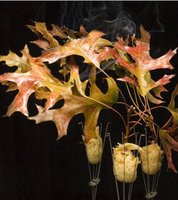 So the Chicago restaurant, Alinea, was named the best restaurant in the country by Gourmet Magazine.
So the Chicago restaurant, Alinea, was named the best restaurant in the country by Gourmet Magazine.Here's how it works: you have two menu choices, one is $125, the other is $175. I don't think that includes wine.
Clearly the surroundings and the presentation are stunning, but one has to wonder: How do you get some of this stuff into your mouth?
('Cause me? I like to eat my food. But that's just me.)
Here's what Wired said about Alinea back in May:
[Chef Grant] Achatz is a California cuisine alum:
He spent four years in Napa Valley working for freshness
fanatic Thomas Keller at the French Laundry, possibly the
best restaurant in the US. [Ed. Not anymore.]
For Achatz, though, the new frontier is preparation. He has
turned to lab equipment and industrial food additives,
pursuing quirky juxtapositions of flavor and texture.(...)
Some of these no-dishes make you laugh out loud; others
seem needlessly weird. But they're all beautiful.
From the May 2006 issue of Wired
The funky implements that Alinea uses in their presentation -- works of art in themselves -- were designed in collaboration with Martin Kastner and are available through Kastner's design company Crucial Detail.
Hot scoop via Andrew at Gaper's Block -- that nice young man who said such sweet things about my Kamin pix.
Update: The General Manager of Typepad hung out with one of Alinea's principals over the summer -- he gave them a nice little shout out on his blog, this is sippey.
Sincerely Roland Wessel (Mr)
a found poem
let me crave your indulgence
solicit your assistance
furnish me
with your particulars
below
in formations
Found in an email from opiliones -- one that she was kind enough to share with me because, I suspect, I am "an honest and trusted person" -- the kind that Mr. Wessel is seeking for his wire transfer.
let me crave your indulgence
solicit your assistance
furnish me
with your particulars
below
in formations
Found in an email from opiliones -- one that she was kind enough to share with me because, I suspect, I am "an honest and trusted person" -- the kind that Mr. Wessel is seeking for his wire transfer.
Tuesday, September 19, 2006
lights out
waiting for the phone to ring
 Feeling blue because the MacArthur folks didn’t call again this year? If you’re not lucky enough to be a genius grant winner, you can do the next best thing: feel like a MacArthur Fellow research subject!
Feeling blue because the MacArthur folks didn’t call again this year? If you’re not lucky enough to be a genius grant winner, you can do the next best thing: feel like a MacArthur Fellow research subject!One of today’s grantees, Chicago girl Jennifer Richeson of Northwestern University, is a social scientist who “examines the behavioral and cognitive consequences of prejudice and racial stereotyping to reveal original insights into the dynamics of interracial interaction” (according the MacArthur web site).
She has absolutely nothing to do with Project Implicit (that I’m aware of), but when I heard her interviewed on Chicago Tonight her research reminded me of a test I took at tolerance.org a few years back that was designed by Project Implicit (a collaboration between Harvard, the University of Virginia and the University of Washington) to test for hidden biases – aka prejudice. My neutral score was hard won: the stress – while testing -- was intense.
Richeson’s research is interested in taking a closer look at that kind of stress -- the "I hope I'm not offending anyone by being a bigoted jerk" variety. (Stop by Project Implicit to subject yourself to the misery and self-loathing: link).
Anyone who’s brave enough to look bigotry square in the eye – to study it, circle it, and turn it inside out to see what makes it tick and how it impacts our daily lives -- is worth half a million dollars in my book.
stock and trade
Well, what is the sense of ruining my head and erasing my memory, which is my capital, and putting me out of business? It was a brilliant cure, but we lost the patient.
Ernest Hemingway commenting on the electroconvulsive therapy that he received shortly before his suicide. As quoted by Jane Brody in the Science section of today’s New York Times.
Monday, September 18, 2006
the new fuzzy math
This debate is occurring because of the Supreme Court's ruling that said that we must conduct ourselves under the Common Article 3 of the Geneva Convention.President George W. Bush’s remarks during his press conference of 15 September 2006.
And that Common Article 3 says that, you know, there will be no outrages upon human dignity. It's like -- it's very vague. What does that mean, outrages upon human dignity? That's a statement that is wide open to interpretation.
For your reference, Mr. President, from Wiktionary.org:
human, adj
1. Of or belonging to the species Homo sapiens or its closest relatives.
2. Having the nature or attributes of a man.
3. Consisting of a man or men.
dignity, noun
1. worth; worthiness; the state of being worthy of respect or esteem
outrage, noun
1. an extremely violent or vicious attack; an atrocity
2. an offensive, immoral or indecent act
3. the resentful anger caused by such acts
Not so vague, really. Not so wide open.
ava
a found poem
Her beauty distracted others
It was an invitation
A property that never seemed
Her own possession
It might be lost through accident
It made men act crazily
It made people forgive her
It was something that age would take
That she could ruin
Above all
It made her lonely
Found in « I’m not an actress », Michael Newton’s review of Lee Server’s new biography, Ava Gardner in the 7 September 2006 issue of the London Review of Books
Her beauty distracted others
It was an invitation
A property that never seemed
Her own possession
It might be lost through accident
It made men act crazily
It made people forgive her
It was something that age would take
That she could ruin
Above all
It made her lonely
Found in « I’m not an actress », Michael Newton’s review of Lee Server’s new biography, Ava Gardner in the 7 September 2006 issue of the London Review of Books
Sunday, September 17, 2006
infrastructure

I’m an indifferent housekeeper – I clean once a week and then I welcome the piles and the clutter and chaos that accumulate as the week unfolds. On the weekend I set things right again. This is my way. Like the ancient cycle of the moon, the mess waxes and wanes, and everyone knows what to expect.
Last weekend my father-in-law arrived. Together with my husband they have been practicing strange masculine rites in the attic, on the roof, in the garage, in the bathrooms, across my kitchen floor, and on the back patio. There has been much murmuring, much furrowing of brow, much dust, mess and debris.
And I am wreck.

Straightening things makes no difference – entropy reigns. I try to get out of the house – to go for long bike rides, walks in the woods. But, of course, I must come home again. When I do I try to stay still and out of the way, to allow them what they will, to perform those odd gestures that I do not understand. Obediently I pick up a paintbrush; I sand where I’m instructed. But the mess is driving me to distraction. Project leads to project: there is no clear end in sight.
In truth, there's nothing that I can do here: this isn't so much about home repairs as it is about men, a father and son, getting together to get things done.
So I do what I must do when I’m out of sorts: I order the world in my own particular way. I take pictures of the chaos. I scout for beauty among the broken bits. And for a little while, just a little while, my world is whole again.

the fact of a doorhandle
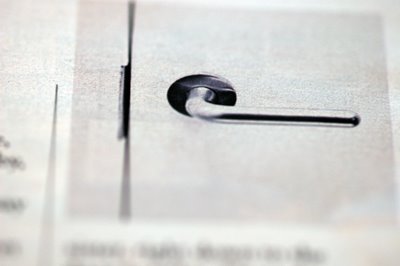
Ludwig Wittgenstein designed a house in Vienna for his sister, right down to the door handles. These door handles have been reproduced, and I had them installed all over my house. I gain great satisfaction from them. I like the idea that a philosopher can design a door handle and it can be such a nice door handle.
Alain de Botton, talking about his door handles, in the
stick it to me
When I say stick, I mean stick. (Yes, it’s phallic. Let’s get that out of the way.) Real stick, real manual, means a shifter on the floor and not two pedals in the foot well but three.(… ) A stick shift does what very little new technology can: make you live fully in the moment.
In « Floor Show: Hugh Garvey defends the dying art of downshifting and double-clutching in this Sunday’s New York Times.
I’m a girl: I care only so much about cars. I have only one requirement about the vehicle that I drive: it must be a stick.
I’ll admit that I lean to Volkswagons – this comes to me by blood, as part of my hippie heritage. We had six VWs in our family, over time, while I was growing up, and one lonely Land Rover when we were living on Conifer Mountain: a grey and white number that we called Mighty Mo. All of the above were manual transmission. The Mighty Mo had four-wheel drive – the kind you had to get out of the car to flip.
I realize there’s something oh-so-girlie about driving a VW, but I suspect I could be swayed away from my heritage by, oh, I dunno: a classic Saab, a cute little Mini, a sweet little Smart Car.
Girlie cars, all.
But baby, don’t mess with my stick. ‘Cause if I’m not driving a stick, I’m not driving.
I left my car (a VW) behind in Seattle when I moved to Chicago, so once I landed a job my next line of business was to walk on to the VW lot and ask them (this was September, a month past August, which Consumer Reports tells us is the best time to buy a new car – if you don’t mind last year’s model – because the lots are willing to discount deeply to clear out old inventory) if they had anything from last year with a stick. They had three. I test drove them all and went home with one. Two hours and the job was done. I credit this to having a tight list of essential requirements.
My sweetie drives a stick. It’s nothing we ever talked about, but it was the first thing I noticed when I slid into his car. For me it was a reassurance – a “yes, this just might work.”
And he was with me on the dealer lot when I asked for the stick offerings. He made no comment at the time, but later, over dinner with some of his old friends who were new to me (it was still early and still awkward and I don't think his friends had yet decided what they thought about me) he told the story, and mentioned, "Apparently it had to be a stick." His buddy said, "Really?" Looked at me, and then back at him, and said: "So she's one of us."
Saturday, September 16, 2006
baby mine

Picture this: You’re in a room, painted white. There are two large movie screens – regular old movie theater size movie screens – erected on the floor, roughly perpendicular to one another. As you enter the room you’re facing the screens; to exit the room you must cross either between or behind the screens (I walked behind).
Projected on either screen are two asynchronous shots of the same elephant, doing elephant like things – getting up, lying down, walking -- in a room painted white, very much like the room painted white in which you are now standing. As a result of the fact that the movie screens are movie theater size large, the elephant is big ass elephant large. As big as, well, an elephant.
This is what Douglas Gordon does (along with some other very cool and entirely different kinds of things with film). There are some brief clips from the installation on the MoMA website, but it doesn’t do the experience justice.
old boyfriends
I have a history of succumbing to summer evenings.
Something in the heat and stillness conjures
Out of the ambient night
Brilliance, communion and desire
Spaces are deeper in July; more vast.
The Philosopher
The Poet
The Player
Time and predilection separates them in space
Only the still, hot buoyancy of a summer night
Unites them in my mind
In the folds of flesh where memory lives
Only the clumsy buttons
The damp grass at our backs
The conviction with all certainty
That I could not live without this
But I did.
We all do.
Their departure survived
By this warm bake of an evening
Air like an oven
After dinner’s been served
Their welcome weight is with me still
Something in the heat and stillness conjures
Out of the ambient night
Brilliance, communion and desire
Spaces are deeper in July; more vast.
The Philosopher
The Poet
The Player
Time and predilection separates them in space
Only the still, hot buoyancy of a summer night
Unites them in my mind
In the folds of flesh where memory lives
Only the clumsy buttons
The damp grass at our backs
The conviction with all certainty
That I could not live without this
But I did.
We all do.
Their departure survived
By this warm bake of an evening
Air like an oven
After dinner’s been served
Their welcome weight is with me still
Friday, September 15, 2006
no brainer
The world is beginning to doubt the moral basis of our fight against terrorism. To redefine Common Article 3 would add to those doubts. Furthermore, it would put our own troops at risk.
General Colin L. Powell (Retired) in a letter to Senator John McCain, 13 September 2006. (Thanks to Paul at locussolus for the del.icio.us link to the PDF.)
Many years ago I sailed in Thailand on a boat populated by Naturists. Very nice people. Very naked people.
It’s important to keep in mind that sailboats are small places. Everyone sits where everyone else has sat many times in the course of one day.
Years later a friend reminded me of a comment that I made to her, when telling her the story of my sailing trip with the Naturists. She said that I said: “I just kept thinking: Your underwear is there to protect all of us.”
I’ll let you draw your own parallels to the Third Geneva Convention.
line of sight
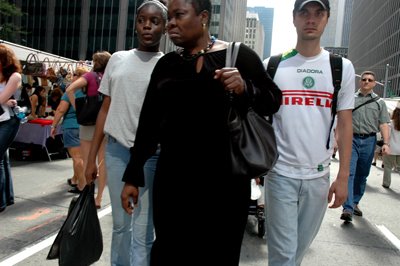
Shooting a picture is holding your breath as all your faculties focus on capturing fleeting reality; then taking a picture becomes a moment of great physical and intellectual delight.
It is a matter of putting your brain, your eye and your heart in the same line of sight. It is a way of life.
Henri Carter-Bresson
more for the book whore
I've discovered something that scares me a little:
The Library Thing.
Sort of like Flickr, but with books.
This could be bad.
Or this could be very, very good.
The Library Thing.
Sort of like Flickr, but with books.
This could be bad.
Or this could be very, very good.
the mind's eye
 Recently I went looking for a copy of Henry Carter-Bresson's The Decisive Moment -- 'cause I thought: how hard could that be to find the emblematic work by one of the 20th Century's greatest photographers?
Recently I went looking for a copy of Henry Carter-Bresson's The Decisive Moment -- 'cause I thought: how hard could that be to find the emblematic work by one of the 20th Century's greatest photographers?Well, it turned out it was pretty tough. Nobody's got it in remainder, and the one that I did manage to track down (I can't even find it online now) was going for something like a grand.
I did see it -- briefly, mockingly, shut away behind glass, at an exhibit at the Art Institute. (Curse them.) I just wanted to read the thing. I thought about going to the guard, like an old lady shopping for jewelry, asking: "Please Sir, could you unlock the case? I'd like to take a closer look."
So imagine my apoplectic delight when I stumbled across this today at the MoMA Store, where I was looking for something else entirely:
Mind's Eye: Writings on Photography and Photographers (HC)
One of the leading lights in photography of the twentieth century, Henri Cartier-Bresson is also a shrewd observer and critic. His writings on photography and photographers, which have appeared sporadically over the past forty-five years, are gathered here for the first time. Several have never before appeared in English. The Mind's Eye features Cartier-Bresson's famous text on "the decisive moment" as well as his observations on Moscow, Cuba, and China during turbulent times, which ring with the same immediacy and visual intensity that he brings to his photography.
Yes, please.
$19.95 at the MoMA Store. ($17.95 for members.)
Sure, it’s cheaper over at Amazon by a little bit, but a girl's gotta dance with him what brung her.
don't stop
like a boy with porn
flashlight in hand, under sheets
i stroke hieroglyphs
I don't talk about my Mayan hieroglyph fetish much -- probably because encounters with pornography are something most of us keep to ourselves -- but when something like this comes out my eyes dilate, my pulse quickens and I get all jumpy inside:
From Writing May Be Oldest in Western Hemisphere in today's New York Times
flashlight in hand, under sheets
i stroke hieroglyphs
I don't talk about my Mayan hieroglyph fetish much -- probably because encounters with pornography are something most of us keep to ourselves -- but when something like this comes out my eyes dilate, my pulse quickens and I get all jumpy inside:
Finding a heretofore unknown writing system is rare. One of the last major ones to come to light, scholars say, was the Indus Valley script, recognized from excavations in 1924.
Now, scholars are tantalized by a[n Olmec] message in stone in a script unlike any other and a text they cannot read. They are excited by the prospect of finding more of this writing, and eventually deciphering it, to crack open a window on one of the most enigmatic ancient civilizations.
The inscription on the Mexican stone, with 28 distinct signs, some of which are repeated, for a total of 62, has been tentatively dated from at least 900 B.C., possibly earlier. That is 400 or more years before writing was known to have existed in Mesoamerica, the region from central Mexico through much of Central America, and by extension, anywhere in the hemisphere.
From Writing May Be Oldest in Western Hemisphere in today's New York Times
consider this
a found poem
Consider the doughnut
Workingman’s food
Light to the touch
Heavy in the gut
Beloved by Homer
Cops
And Canadians
Found in this week’s New Yorker
Consider the doughnut
Workingman’s food
Light to the touch
Heavy in the gut
Beloved by Homer
Cops
And Canadians
Found in this week’s New Yorker
formerly known as
It is absolutely the perfect name. She causes strife by causing arguments among men, by making them think their opinions are right and everyone else’s is wrong. It really is just perfect.
Dr. Michael E. Brown, a professor of planetary astronomy at the California Institute of Technology, commenting on the recent renaming of the planet Xena to Eris, after the goddess of discord and strife in Greek mythology. As reported in this morning’s New
Thursday, September 14, 2006
paris in chicago

There's a wonderful little piece of Paris perched on Michigan Avenue, in Chicago, right next door to the Art Institute: A beautiful Hector Guimard Art Nouveau Metro castiron entranceway frames the stairs that descend to the Van Buren Street Station.
The City of Paris was selling them off for a brief while -- they were busy modernizing -- until some savvy official looked up from his pile of paperwork and said "Oh Sh*t!" and stopped that quick.

dang.
I was famous for all of like, 15 minutes, and I missed the whole thing.
Andrew posting in Gaper's Block: Art & Architecture on 31 August
That'll teach me to do things like leave town for the weekend.
A Little
Architecture Break
Dayna Bateman, who took the photo you see in Rearview today, took a class with Tribune architecture critic Blair Kamin this summer. Her photos from the field are lovely.
Andrew posting in Gaper's Block: Art & Architecture on 31 August
That'll teach me to do things like leave town for the weekend.
sight unseen
The majority of Germans have never seen a living Jew.
Daniel, a German and a Rabbi, whose last name I’m afraid I didn’t catch. He’s one of three Rabbis who were ordained today in Dresden, Germany – the first Jewish religious officials to be ordained in that country since the end of World War II. Interviewed today on the PRI’s The World radio program.
So few words. So much suffering. Like Hemingway’s six word story: For sale: baby shoes, never used.
just do it
That’s not to say that one has to be chased around Pamplona by bulls to gain experience. It could be something as slight as the difference between the poem one might get from a poet strolling past a construction site versus the poem one might get from the poet who is pouring concrete.
Either could produce the better poem, of course, but the latter’s will be more deeply informed by experience. “To change your language,” as Derek Walcott says, “you must change your life.”
John Barr in « American Poet in the New Century » from the September issue of Poetry
lost love
a found poem
A ruddy, alluring come-on
That persists
More nuanced
Richer, fuller,
More viscous in your mouth
Poem found in Peter Meehan’s piece Espresso’s New Wave Hits Town in yesterday’s New York Times
My old neighborhood coffee joint, Vivace on Capitol Hill in Seattle, got a shout out in the same piece.
Sometimes I’m so lonesome for that place I could cry.
A ruddy, alluring come-on
That persists
More nuanced
Richer, fuller,
More viscous in your mouth
Poem found in Peter Meehan’s piece Espresso’s New Wave Hits Town in yesterday’s New York Times
My old neighborhood coffee joint, Vivace on Capitol Hill in Seattle, got a shout out in the same piece.
Sometimes I’m so lonesome for that place I could cry.
Wednesday, September 13, 2006
home on the range
I wrote this story up for a friend who shared a great Wyoming fish story about leeches, and I’m of the opinion that it’s just not right to get a good story like that without sharing one in return. This one isn’t as good as the leech story, but it’s the only Wyoming story I had handy, so it’ll have to do.
This story is only interesting because it happened at all.
Seven years into my marriage to B., one year before he decided to go his own way, two years before I found out about his new direction, and three years before the divorce decree was final, we went to Yellowstone. The trip saved us for a little while, but it wasn’t enough to save us altogether.
I had been sick too much (and hadn't yet been diagnosed or received the treatment that would cure me good), he had been working too much, and we hadn’t seen much of each other at all for awhile. So we took three days off from work and drove the distance from Seattle to Gardiner, Montana in a day.
We didn’t tell anyone that we were going. We just left.
We listened to the audiotape of a River Runs Through It on the drive. I had seen the movie, but was unprepared for the whammy that the book packed. My grandfather had died a few years before this trip, and I was missing him fiercely. He was born in Gardiner, and approached fly fishing like the sacrament that it is to most folks around there. He had one of those holy tackle boxes that I suspect your grandfather had, and his reels were all stored lovingly in purple felt Crown Royal pouches. (Bompa liked to drink almost as much as he liked to fish.)
So Maclean’s book made me think of Bompa – the father character especially -- and it also made me think of my dad – the younger son character did that – the changes he goes through with his family and the conclusions that the brother comes to by the end of the book about his brother.
My dad is a brilliant guy – but it's the kind of brilliant that’s full of heartbreak. We’ve always been close – he's close to all his kids -- and we’re both given to long, rambling philosophical wanderings -- I’ve had more long conversations about crazy things that make perfect sense with my father than with anyone else I’ve known.
But from the time I was in high school to just a few years ago he was going through some hard times financially, and after all we kids moved out of the house he headed to the hills to hide out and figure out what to do next. He was living in Green River, Wyoming on very little at the time of this story, and I hadn’t seen him since my grandfather's funeral, about two years before. I wasn’t too concerned about it – it was normal by this point – and I didn’t feel estranged from him – but I missed him.
So I sobbed my way through the last chapter of the audio book, and was thinking long and hard on my father and my grandfather and the strange terroir of the place I was in and wondering why I felt more at home there than anywhere else in the world.
It was autumn when we went, heading into winter: The grasses were golden and the buffalo and the elk were seeking out the heat of the hot springs and the geysers in the belly of the caldera, where the steam rose into the icy air.
We stayed the first night at Mammoth Hot Springs – and learned when we got there that the road we expected to take straight down to Yellowstone Lodge had just been closed for the winter. We would have to take a longer road around the next day to get where we were going. Our route would take us by the big old grand hotel on Lake Yellowstone (built in the 1890s) – I had read about it, and wrote it off in favor of going straight to Yellowstone Lodge (largest log cabin structure in the world!) and staying there for a couple of nights in a row. But since we had to go by there anyway I thought it would be cool to stay the night. I asked B. if he would be open to that. He said “No.”
I then did something unusual: even though he said no, I said, “well, I would”, and then turned to the ranger behind the desk, who was explaining all this to me, and asked if he could help me shuffle our reservations around. This probably had something to do with the fact that I’m a sucker for National Park hotels and lodges and hope to visit every one of them before I die, and also with the fact that B. had been whining about something and I was feeling impatient with him, but I like to think it also had something to do with getting the stars into alignment for what would happen next.
So we set out on our drive for the Lake Yellowstone Hotel, with all kinds of plans to stop and do all kinds of things. The sun was intensely bright that whole day – especially amazing having just come out of the drizzle of Seattle – but the wind had blown all the clouds away and there was no cover to keep the heat in – the temperatures dropped and it was getting really cold really fast. Given the wind and the cold we canceled our plans to hike down to Yellowstone Falls, and cancelled a handful of other stops as well. We did pause to see a black bear that had wondered down to the road and attracted a crowd, and to see some buffalo along the way. But our timing was nothing like we had originally planned it to be.
When we pulled into the hotel parking lot and opened our car doors the wind threw them wide open, and then swept through the car and hurled our map out into the parking lot. We knew immediately that it would be impossible to chase it down, given the speed at which it was traveling. Even still we took a few seconds to discuss whether we were going to do the virtuous thing. We decided we wouldn’t, and headed instead into the hotel.
I only tell you that because if we had chased the map, this next thing wouldn't have happened.
It was eerily still in the hotel – we’d figure out in just a little while that this was because the wind storm had knocked the power out -- but this wasn’t immediately apparent because of all the windows and the natural light that poured into the hallways. We walked the long hall from the parking lot to the front desk, and then, for some reason, instead of approaching the desk to check in, I decided to take a look at the lake.
The wind was so fierce that white caps were kicking up on the surface. It was gorgeous. It was so still in hotel without the hum of electricity that every sound was in high relief. I think it's in large part because of this that, as I was crossing to the windows to see more of the waves, I heard the sound of my father’s voice.
I didn’t hear what he said – I heard just the music of his voice. A single note. Later I learned that he had just said “thanks” to someone who gave him the time. If he had been wearing a watch I would have missed him altogether.
He was standing halfway out the doors to my left when he said it, and paused only briefly before continuing on his way to his pickup, which was still running in the circular drive in front of the hotel.
He’d been traveling to see a client when he found that a tree felled in the wind storm was blocking the road. So he circled through Yellowstone to use the telephone and let his customer know what the hold up was. And now he was about to drive off again.
But I didn’t know any of that yet: I just turned and saw him walking away. So I said: “Dad?”
And he turned with a look of complete bafflement on his face – it probably looked just like mine – and said: “Daughter?”
So then of course there were hugs and laughter and stories and he stayed for a couple of hours and we hung out in the lobby and caught up and hugged and laughed some more.
And the whole time it seemed both extraordinary and absolutely ordinary that this was happening.
And after those couple of hours had passed he said goodbye and drove off, and we checked into our room.
This story is only interesting because it happened at all.
Seven years into my marriage to B., one year before he decided to go his own way, two years before I found out about his new direction, and three years before the divorce decree was final, we went to Yellowstone. The trip saved us for a little while, but it wasn’t enough to save us altogether.
I had been sick too much (and hadn't yet been diagnosed or received the treatment that would cure me good), he had been working too much, and we hadn’t seen much of each other at all for awhile. So we took three days off from work and drove the distance from Seattle to Gardiner, Montana in a day.
We didn’t tell anyone that we were going. We just left.
We listened to the audiotape of a River Runs Through It on the drive. I had seen the movie, but was unprepared for the whammy that the book packed. My grandfather had died a few years before this trip, and I was missing him fiercely. He was born in Gardiner, and approached fly fishing like the sacrament that it is to most folks around there. He had one of those holy tackle boxes that I suspect your grandfather had, and his reels were all stored lovingly in purple felt Crown Royal pouches. (Bompa liked to drink almost as much as he liked to fish.)
So Maclean’s book made me think of Bompa – the father character especially -- and it also made me think of my dad – the younger son character did that – the changes he goes through with his family and the conclusions that the brother comes to by the end of the book about his brother.
My dad is a brilliant guy – but it's the kind of brilliant that’s full of heartbreak. We’ve always been close – he's close to all his kids -- and we’re both given to long, rambling philosophical wanderings -- I’ve had more long conversations about crazy things that make perfect sense with my father than with anyone else I’ve known.
But from the time I was in high school to just a few years ago he was going through some hard times financially, and after all we kids moved out of the house he headed to the hills to hide out and figure out what to do next. He was living in Green River, Wyoming on very little at the time of this story, and I hadn’t seen him since my grandfather's funeral, about two years before. I wasn’t too concerned about it – it was normal by this point – and I didn’t feel estranged from him – but I missed him.
So I sobbed my way through the last chapter of the audio book, and was thinking long and hard on my father and my grandfather and the strange terroir of the place I was in and wondering why I felt more at home there than anywhere else in the world.
It was autumn when we went, heading into winter: The grasses were golden and the buffalo and the elk were seeking out the heat of the hot springs and the geysers in the belly of the caldera, where the steam rose into the icy air.
We stayed the first night at Mammoth Hot Springs – and learned when we got there that the road we expected to take straight down to Yellowstone Lodge had just been closed for the winter. We would have to take a longer road around the next day to get where we were going. Our route would take us by the big old grand hotel on Lake Yellowstone (built in the 1890s) – I had read about it, and wrote it off in favor of going straight to Yellowstone Lodge (largest log cabin structure in the world!) and staying there for a couple of nights in a row. But since we had to go by there anyway I thought it would be cool to stay the night. I asked B. if he would be open to that. He said “No.”
I then did something unusual: even though he said no, I said, “well, I would”, and then turned to the ranger behind the desk, who was explaining all this to me, and asked if he could help me shuffle our reservations around. This probably had something to do with the fact that I’m a sucker for National Park hotels and lodges and hope to visit every one of them before I die, and also with the fact that B. had been whining about something and I was feeling impatient with him, but I like to think it also had something to do with getting the stars into alignment for what would happen next.
So we set out on our drive for the Lake Yellowstone Hotel, with all kinds of plans to stop and do all kinds of things. The sun was intensely bright that whole day – especially amazing having just come out of the drizzle of Seattle – but the wind had blown all the clouds away and there was no cover to keep the heat in – the temperatures dropped and it was getting really cold really fast. Given the wind and the cold we canceled our plans to hike down to Yellowstone Falls, and cancelled a handful of other stops as well. We did pause to see a black bear that had wondered down to the road and attracted a crowd, and to see some buffalo along the way. But our timing was nothing like we had originally planned it to be.
When we pulled into the hotel parking lot and opened our car doors the wind threw them wide open, and then swept through the car and hurled our map out into the parking lot. We knew immediately that it would be impossible to chase it down, given the speed at which it was traveling. Even still we took a few seconds to discuss whether we were going to do the virtuous thing. We decided we wouldn’t, and headed instead into the hotel.
I only tell you that because if we had chased the map, this next thing wouldn't have happened.
It was eerily still in the hotel – we’d figure out in just a little while that this was because the wind storm had knocked the power out -- but this wasn’t immediately apparent because of all the windows and the natural light that poured into the hallways. We walked the long hall from the parking lot to the front desk, and then, for some reason, instead of approaching the desk to check in, I decided to take a look at the lake.
The wind was so fierce that white caps were kicking up on the surface. It was gorgeous. It was so still in hotel without the hum of electricity that every sound was in high relief. I think it's in large part because of this that, as I was crossing to the windows to see more of the waves, I heard the sound of my father’s voice.
I didn’t hear what he said – I heard just the music of his voice. A single note. Later I learned that he had just said “thanks” to someone who gave him the time. If he had been wearing a watch I would have missed him altogether.
He was standing halfway out the doors to my left when he said it, and paused only briefly before continuing on his way to his pickup, which was still running in the circular drive in front of the hotel.
He’d been traveling to see a client when he found that a tree felled in the wind storm was blocking the road. So he circled through Yellowstone to use the telephone and let his customer know what the hold up was. And now he was about to drive off again.
But I didn’t know any of that yet: I just turned and saw him walking away. So I said: “Dad?”
And he turned with a look of complete bafflement on his face – it probably looked just like mine – and said: “Daughter?”
So then of course there were hugs and laughter and stories and he stayed for a couple of hours and we hung out in the lobby and caught up and hugged and laughed some more.
And the whole time it seemed both extraordinary and absolutely ordinary that this was happening.
And after those couple of hours had passed he said goodbye and drove off, and we checked into our room.
Tuesday, September 12, 2006
your attention, please
If you're not outraged, you're not paying attention.
Bumpersticker seen tonight on the road home.
plutoed
Verb. to pluto someone or something is to downgrade, demote or remove altogether from a prestigious group or list, like what was done to the planet of the same name.
Running just now on the home page of the Urban Dictionary when I stopped by to look something up.
He was plutoed like an old pair of shoes.
Running just now on the home page of the Urban Dictionary when I stopped by to look something up.
More on words at detritus »
in accord
Six months after moving to Paris, I gave up on French school and decided to take the easy way out. All I ever said was "Could you repeat that?" And for what? I rarely understood things the second time around, and when I did it was usually something banal, the speaker wondering how I felt about toast, or telling me that the store would close in twenty minutes. All that work for something that didn't really matter, and so I began saying, "D'accord," which translates to "I am in agreement," and means, basically, "O.K." The word was a key to a magic door, and every time I said it I felt the thrill of possibility.
From In the Waiting Room: The Advantages of Speaking French by David Sedaris in this week's New Yorker
David Sedaris' piece in this week's New Yorker (which is a hundred times funnier than what you're about to read below – and really, you should probably go read that now instead) immediately made me think of traveling with my grandmother, who was raised in a Norwegian speaking household but had never been to Norway until she hit her mid-70s. In Norway she binged on the language like a kid on candy – engaging in long rambling conversations with every cab driver, waiter, and public official that we met.
I sat in silence for the duration of these interlocutions, wondering what she was saying, able to make out only brief phrases like "meine barne barne" (which meant me, I think -- her "child's child") (and, of course, is only a bare phonetic approximation of the actual spelling, because, as should now be evident, I don’t speak – or spell -- Norwegian).
Keep in mind, Norway seemed to be a quiet country – at least the public places were. Folks didn't chat much, idly or for any other reason, and exercised such social restraint that I really had to wonder how my grandmother or I, both given to loquaciousness when we get a good head of steam on, could be of that stock. So given that, my grandmother's voice was frequently the only one to be heard in the vast silences, filling the air with her Norwegian-American accent which just about everybody (when asked) commented was "good, but just a little gravely" – except, of course, for the folks down south around Stavanger, where her own grandmother was from, who thought her accent was exceptional.
As a survival mechanism I begged my grandmother to "teach me to say something agreeable" in Norwegian, and so she taught me to say (here again, spelled phonetically, not correctly): "Ja: da trög." Which she explained meant: "Yes: That's true." Or more true to the spirit: "That's what I think, too."
From there on out we made a most agreeable couple: My grandmother would take off on a ramble, and I would sit there in silence, nodding agreeably, until she came to what sounded like a conclusion. Generally, at that point she would turn to me and ask something with a slight inflection, to which I would answer: "Ja: da trög."
At which my grandmother would turn back to her audience and keep right on going.
the macbeth effect
Live Schereiber, who played Macbeth to critical acclaim this summer at the Delacorte Theater in Central Park, said the moral weight of the murder in the play was exhausting. And he said that cast members lined up to shower at the theater, rather than waiting until they got home.From « Lady Macbeth Not Alone in Her Quest for Spotlessness » in this morning’s New York Times, an article that reports on a Northwestern study that found students asked to contemplate an unethical act (one of their own) were twice as likely to accept the gift of an antiseptic wipe over a pencil at the conclusion of the study.
“That was unusual – usually no one uses those theater showers,” Mr. Schreiber said.
The article also states:
In another experiment, the researchers found that students who had been contemplating an unethical deed rated the value of cleaning products significantly higher than peers who had been thinking about an ethical act.People who washed their hands after contemplating an unethical act were less troubled by their thoughts than those who didn’t, the study found.
(…)
Monday, September 11, 2006
rosebud
A friend in NYC who’s gigging for Hearst Publishing recommended that we stop by to see the new Hearst Tower just off Columbus Circle when we were in town.
It’s a towering glass skyscraper that sprouts from inside an original art deco six-story structure that went up back in the 1920s – and it's particularly interesting because it’s a green building that, among other things, extracts 60% of the water it needs to keep its bathrooms operational from collected rainwater. (I hope I’m remembering that right, because now that I’m quoting it, it seems awfully, well, dang virtuous.)
We stopped in on Sunday just before Labor Day, when it was locked up tight, and we could only step into the silent lobby to admire the soaring atrium in which the elevators, just beyond the security gates, ascend steeply through a tiered glass waterfall, to where the business gets done.
I was disappointed in my photos and had nothing more impressive to share here than “Wow. Cool.” so I didn’t expect that I would say anything at all – but then Blair Kamin went ahead and reviewed the building as part of a larger article this last Sunday in the Chicago Tribune called What Price Security? Architecture in an anxious age.
So with apologies to Blair, I thought I’d crib some of his comments here (with full attribution, of course) -- as well as throw in a few pics (because what kind of a Flickr whore would I be if I didn't get the pics in there?):
From Blair Kamin’s piece in the 10 September 2006 issue of the Chicago Tribune: « What Price Security? Architecture in an anxious age »
It’s a towering glass skyscraper that sprouts from inside an original art deco six-story structure that went up back in the 1920s – and it's particularly interesting because it’s a green building that, among other things, extracts 60% of the water it needs to keep its bathrooms operational from collected rainwater. (I hope I’m remembering that right, because now that I’m quoting it, it seems awfully, well, dang virtuous.)
We stopped in on Sunday just before Labor Day, when it was locked up tight, and we could only step into the silent lobby to admire the soaring atrium in which the elevators, just beyond the security gates, ascend steeply through a tiered glass waterfall, to where the business gets done.
I was disappointed in my photos and had nothing more impressive to share here than “Wow. Cool.” so I didn’t expect that I would say anything at all – but then Blair Kamin went ahead and reviewed the building as part of a larger article this last Sunday in the Chicago Tribune called What Price Security? Architecture in an anxious age.
So with apologies to Blair, I thought I’d crib some of his comments here (with full attribution, of course) -- as well as throw in a few pics (because what kind of a Flickr whore would I be if I didn't get the pics in there?):
Located near the southwest corner of Central Park and framed in a triangular steel structure known as a diagrid, the 46-story office building shoots out of an eclectic six-story base designed in the 1920s for press lord William Randolph Hearst by the architect and theater designer Joseph Urban.
The tower has a dazzling sculptural presence, flying above the old masonry building in a way that perfectly complements it.
It is at once a fresh take on the verticality of the classic New York setback sky scraper and a paragon of green architecture, the enlightened global movement that responds to the reality that big buildings are big energy guzzlers, consuming more than half of the energy used worldwide.
With the diagrid’s open fishnet letting waves of natural light flow into office floors, the skyscraper is projected to use 26 percent less electricity than a typical high-rise.
Yet neck-craners who take in this eye popper from the sidewalk are surely unaware that Foster and his associates re-examined every aspect of it after 9/11.
On the upper floors, they replaced conventional glass with blast-resistant laminated glass. And the upper floor of the building’s lobby – a nearly 100-foot-tall space with recycled water running down slanting walls of class – was closed to the public.
Here is a troubling sign that the grand public spaces within skyscrapers, whose chockablock concentrations of stores and restaurants make them cities in miniature, are increasingly private inner worlds, reserved for the sole use of their occupants.
From Blair Kamin’s piece in the 10 September 2006 issue of the Chicago Tribune: « What Price Security? Architecture in an anxious age »
dusk
I regret that dusk isn’t what it was
touch football turned to tackle
neighborhood kids -- heat-seekers all
chasing off the chill
charging loose limbed into a pile
eight kids deep
the Nerf ball buried at the bottom
is just a feint
we need this warm pyre
all of it
to chase off what we know
that the last of summer is spent
and so
raked like fallen leaves
these warm complicitous bodies
grunt, laugh and struggle
combustible
the streetlight sputters on
and we pretend not to hear the far cries
the grown up voices
dinner is ready
but we are not
touch football turned to tackle
neighborhood kids -- heat-seekers all
chasing off the chill
charging loose limbed into a pile
eight kids deep
the Nerf ball buried at the bottom
is just a feint
we need this warm pyre
all of it
to chase off what we know
that the last of summer is spent
and so
raked like fallen leaves
these warm complicitous bodies
grunt, laugh and struggle
combustible
the streetlight sputters on
and we pretend not to hear the far cries
the grown up voices
dinner is ready
but we are not
Sunday, September 10, 2006
death or glory

My godson was in Chicagoland over the weekend to play in an Ultimate Frisbee Tournament. His team -- Death or Glory (DoG) out of Boston -- successfully decimated the competition.
I got to watch -- which sent me into all kinds of fond reverie re high school crushes and Ultimate-playing boyfriends -- and take some pics, which was just what I needed to keep my mind off the plunging temperatures and the fact that I'm friggin' old enough now to have a 24-year old godson. (How did that happen?)
Here's a link to slideshow featuring some pics from the game »
free fall
a found poem
He departs from this earth like an arrow
relaxed
hurtling through the air
comfortable in the grip
of unimaginable motion
arms by his side
left leg bent
white shirt billowing free
perfectly vertical
in accord
with the lines of the buildings
behind him
he splits them
bisects them
North Tower; South.
he is the essential element
in the creation
of a new flag
steel bars
shining in the sun
something discordant
and therefore terrible:
Freedom.
This poem was found in Tom Juno’s article « The Falling Man » which appeared in Esquire in 2003
He departs from this earth like an arrow
relaxed
hurtling through the air
comfortable in the grip
of unimaginable motion
arms by his side
left leg bent
white shirt billowing free
perfectly vertical
in accord
with the lines of the buildings
behind him
he splits them
bisects them
North Tower; South.
he is the essential element
in the creation
of a new flag
steel bars
shining in the sun
something discordant
and therefore terrible:
Freedom.
This poem was found in Tom Juno’s article « The Falling Man » which appeared in Esquire in 2003
Saturday, September 09, 2006
meridians
The Chinese doctor
listens close
to the winds in my pulse
once strong licking flames of yang
(you should take to the sea,
she told me then,
more water, more yin,
to balance the fire.)
The pulses flutter now
beaten, weakened and tired.
“We will work on the lung meridian”
she tells me
“That’s where grief settles in.”
She knows this from listening
but I’ve told her no stories
I am quiet. Becalmed
on salty water.
She goes to work
Tracing my horizons. Mapping my meridians
calling the fire back.
Home again I'm met
by a thought
stamped and set to sail
across meridians
arriving
like a cat’s paw skittering across the surface of the sea
and I lift my head
like a sailor hungry for a breeze
This tender lick of flame
(really just a postcard)
reminds me
that never did my friend take his leave
(he whose leaving this last time
has taken my breath from me)
without leaving a gift behind.
And so he has.
(Dear friend.)
listens close
to the winds in my pulse
once strong licking flames of yang
(you should take to the sea,
she told me then,
more water, more yin,
to balance the fire.)
The pulses flutter now
beaten, weakened and tired.
“We will work on the lung meridian”
she tells me
“That’s where grief settles in.”
She knows this from listening
but I’ve told her no stories
I am quiet. Becalmed
on salty water.
She goes to work
Tracing my horizons. Mapping my meridians
calling the fire back.
Home again I'm met
by a thought
stamped and set to sail
across meridians
arriving
like a cat’s paw skittering across the surface of the sea
and I lift my head
like a sailor hungry for a breeze
This tender lick of flame
(really just a postcard)
reminds me
that never did my friend take his leave
(he whose leaving this last time
has taken my breath from me)
without leaving a gift behind.
And so he has.
(Dear friend.)
Friday, September 08, 2006
not so secret
Since July 1, when the campaign began, about 8,500 secrets have appeared, Ms. Yates said, on themes like "long-lost loves," forbidden passions and careers.
The secrets are also going up on giant digital signs on the Reuters Building in Times Square.
From a
So when does a secret stop being a secret and become a confession?
slacklining
A lot of sports is about domination. Allowing the slackline to be the slackline is the most important step for most people. Thoughts are too big to think that quickly.
Scott Balcom, author of Walk the Line, on slacklining in today's New York Times
Not so eloquent, but kind of intriguing.
Thursday, September 07, 2006
getting a leg up

"God is in the details," Mies van der Rohe is supposed to have said. He did not simply mean that building details are important; he meant that they are the very soul of architecture.
An easy way to appreciate this is to look at how different architects handle a very simple detail, such as a door handle, a baseboard—or a stair balustrade. The function of a balustrade is straightforward: It is both a guardrail and a climbing support. Yet the variety of designs that can perform these functions is vast.
From « Upstairs, Downstairs: How Small Details Make Great Architects », a photo essay on -- yep -- stairs, in today's Slate.
Wednesday, September 06, 2006
yo.
According to a study by British scientist Rupert Sheldrake, telephone telepathy does exist and now he wants to find out if the phenomenon extends to text messaging.Reported today in the British Globe and Mail
No word on whether the study participants were armed with Caller ID.
In other news (sorta): A girlfriend of mine who's a family practice physician told me once a long time ago that she had a patient come in for a pregnancy test -- the woman felt fine, but her boyfriend was experiencing something that resembled morning sickness, so he asked her to get the test.
Turned out she was pregnant.
full stop
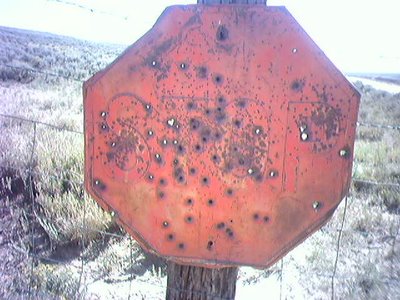
Most of my hours behind the steering wheel have been logged west of the Mississippi, which I never thought meant much until I moved east of the Mississippi.
The North and the South have got nothing on the cultural differences between Westerners and Midwesterners.
Stopping is one of those things that are done differently, depending upon which side of the mighty Miss you spend your time. Once you’re west of the river, if you happen to be driving within an area where traffic is sparse and people are few, you’re generally allowed what’s known as a “California stop” – that is, a gentle coast and glide up to the stop sign, a brief pause where you get a good look at the road to the left and the right of you, but never quite completely stop, before you move through the stop sign.
Maybe some westerners will disagree, but the California stop was so much a part of the driving culture of my family, that I was cautioned strongly to “come to a full and complete stop” by my father when I saddled up to take the driver’s license test. For his part, he never did. That I ever saw.
I married a careful Midwestern driver, and my lax western ways behind the wheel pretty much make him crazy. I do what I can to conform to keep the peace, but the habits of my ancestors run deep and are hard to shake.
Three years ago on Labor Day weekend we got a phone call that changed everything. It was one of those late night calls that you know are up to no good as soon as you hear the phone ring at 11.30. My father had collapsed during a hike through Utah’s Red Rock Canyon wilderness, had been airlifted to a trauma center in Grand Junction, Colorado, and wasn’t expected to live.
The nurses weren’t committing to that diagnoses, of course – all they would say was: “If you want to see your father again you should come right now.”
So we did. All four kids with family in tow, his mother, sister, girlfriend, ex-wife and ex-mother-in-law converged on Grand Junction within the next twelve hours.
He was barely alive, and stayed that way for a good week. By a stroke of good luck the physician assigned to my father was Dr. Honeycutt, an army doc who had left the military just the month before for an easy retirement at St. Mary’s, who knew trauma like nobody’s business, and saved my father’s life.
But it was a good week before we began to suspect that he might live, and a good month before we knew that things had a chance of being normal again – by then his kidneys and liver, which appeared to have given up the ghost earlier – had returned to him and started functioning again. And the infection that felled him on the hiking trail in the first place seemed to have abated (it would flare up again about a year later, but gratefully was beaten back into submission).
During those weeks I spent the days with my family just being there – which is really all you can do when someone you love is knocked flat like that. Just show up and be there, for as long as you need to be. I did my crying at night, in the dark, in the strong arms of my Midwestern boy, he of the full stops, who knows the value of good tight hug when you feel like your whole insides have exploded and spread across the heavens, and there’s no hope of getting them all back inside. Ever.
About three days into the worst of it, we needed to travel to Bluff, Utah, where my father had left his car at his buddy’s place before they headed out for the hike, because my dad’s girlfriend needed the car to get around. (She had been burying her mother in Michigan when the accident occurred, and arrived like us at the bedside, dazed and terrified, within the first twelve hours.)
The three of us – me, my sweetie, and my father’s sweetie, Cookie, a Michigan girl who has been thoroughly converted to Western ways – piled into our rental car and started the trek, covering the distance that my father had covered a few days earlier in a helicopter, counting down the miles through the far western edge of Colorado, through Moab, Utah and on to Bluff; feeling the remoteness of the surroundings, thinking of him lying there in the severe heat of the canyon area, unable to move, suffering from heat exhaustion and who knew what else (at this point they still didn’t know what laid him flat) while he waited two hours for help to come.
I spent most of that drive wondering if my father would ever wake up.
So it was a sober drive. Which is where the stop sign comes in.
After many hours we pulled into Bluff, Utah – a simmering caldera where very few people try to live. Cookie was the navigator – she knew where the house was -- “Straight to the end of this road and then left,” she said, as my darlin’ companion approached a stop sign. In the middle of nowhere. Not a soul in sight. Lacking only tumbleweed to make the scene complete. He slowed to a stop.
Cookie repeated herself: “Straight ahead. You need to go straight--- a--- head.” She turned and looked at our driver – utter confusion on her face -- trying to figure out what was happening. Why our forward progress had been frustrated. Why, for god’s sake, we were STOPPPING.
Then she looked up, and saw the stop sign; looked back to my sweetie, then to me, then back to the stop sign.
And laughed. Like cool water in the desert.
I laughed with her. And our good Midwestern boy shook his head, knowing that he had the situation under control, knowing there was no good reason to laugh at that: a stop sign is a stop sign is a stop sign.
And I knew that I could count on those steady ways in the dark when the laughter was gone and the tears had come again.
[Photo credit: b1-66er]
Subscribe to:
Posts (Atom)


